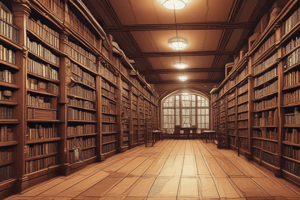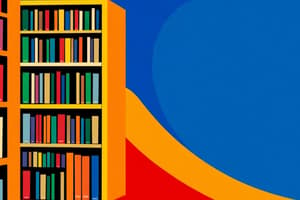Podcast
Questions and Answers
What are the key elements involved in the collection development process?
What are the key elements involved in the collection development process?
Policies and Procedures, Collection Development Policy, Selection and Acquisition, and others
What is the primary goal of collection development in libraries?
What is the primary goal of collection development in libraries?
To ensure that library patrons have access to relevant and high-quality information, regardless of format or location
What is the purpose of a collection development policy?
What is the purpose of a collection development policy?
To outline the library's priorities, goals, and purposes for resource allocation
How do librarians make informed decisions about which resources to add to the collection?
How do librarians make informed decisions about which resources to add to the collection?
What is the importance of constantly updating and re-evaluating existing collections?
What is the importance of constantly updating and re-evaluating existing collections?
What is the process of evaluating and removing outdated or irrelevant resources from a library's collection known as?
What is the process of evaluating and removing outdated or irrelevant resources from a library's collection known as?
What is weeding in the context of collection development?
What is weeding in the context of collection development?
What types of materials do modern library collections include, besides physical materials like books and journals?
What types of materials do modern library collections include, besides physical materials like books and journals?
Why is it important for libraries to ensure that their collections reflect the needs and interests of all users?
Why is it important for libraries to ensure that their collections reflect the needs and interests of all users?
What is the key to adapting to new technologies and data management practices in library collection development?
What is the key to adapting to new technologies and data management practices in library collection development?
What is essential for libraries to have in place to guide the development of their collections?
What is essential for libraries to have in place to guide the development of their collections?
What is the ultimate goal of collection development in libraries?
What is the ultimate goal of collection development in libraries?
Flashcards
Collection Development
Collection Development
The process of selecting, acquiring, and maintaining library resources, ensuring relevance and quality.
Collection Development Policy
Collection Development Policy
A formal document guiding decisions about what resources a library acquires and how it manages its collections.
Selection and Acquisition
Selection and Acquisition
The process of choosing and getting resources to add to a library's collection.
Evaluation and Deselection
Evaluation and Deselection
Signup and view all the flashcards
Formats and Access
Formats and Access
Signup and view all the flashcards
Diversity, Equity, and Inclusion
Diversity, Equity, and Inclusion
Signup and view all the flashcards
Policies and Procedures
Policies and Procedures
Signup and view all the flashcards
Weeding
Weeding
Signup and view all the flashcards
Study Notes
Collection development is a crucial aspect of libraries, encompassing the systematic assessment, selection, and deselection of library resources to ensure that library patrons have access to relevant and high-quality information, regardless of format or location. It involves planning, building, and maintaining a library's information resources in a cost-effective and user-relevant manner. The collection development process is not only about acquiring new resources but also about constantly updating and re-evaluating existing collections to meet the changing needs of library users.
The collection development process involves several key elements:
-
Policies and Procedures: Libraries establish policies and procedures to guide the acquisition, management, and disposal of library resources. These policies outline the criteria for selecting resources, assessing collections, weeding, preserving, and deciding appropriate formats.
-
Collection Development Policy: A collection development policy is a formal document that outlines the library's priorities, goals, and purposes for resource allocation. It includes criteria such as topic, reading level, currency, demand, cost, author's credentials, publisher's reputation, features, resource sharing, and format.
-
Selection and Acquisition: Librarians use industry tools, user feedback, and their own knowledge to make informed decisions about which resources to add to the collection.
-
Evaluation and Deselection: Libraries regularly evaluate their collections to determine which resources are still relevant and useful, and which ones should be removed or replaced. This process, known as weeding, helps to maintain the quality and relevance of the collection.
-
Formats and Access: Today's library collections include not only physical materials like books, journals, and videos, but also digital resources like ebooks, databases, and streaming video. Libraries must consider how to provide access to both traditional and emerging formats, and how to balance the costs and benefits of different access models.
-
Diversity, Equity, and Inclusion: As society becomes increasingly diverse, libraries must ensure that their collections reflect the needs and interests of all users. This may involve actively seeking out resources that represent a range of perspectives and experiences.
-
Technology and Data Management: Libraries must adapt to new technologies and data management practices to effectively manage their collections and provide the best possible service to their users.
In conclusion, collection development is a complex and ongoing process that requires careful planning, evaluation, and adaptation. It is essential for libraries to have well-defined policies and procedures in place to guide the development of their collections and ensure that they continue to meet the needs of their users.
Studying That Suits You
Use AI to generate personalized quizzes and flashcards to suit your learning preferences.




